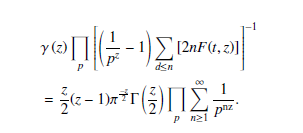The Derivation of the Riemann Analytic Continuation Formula from the Euler’s Quadratic Equation
Keywords:
Riemann zeta function, Euler’s equation, Meromorphic function, Non-trivial zerosAbstract
The analysis of the derivation of the Riemann Analytic Continuation Formula from Euler’s Quadratic Equation is presented in this paper. The connections between the roots of Euler’s quadratic equation and the Analytic Continuation Formula of the Riemann Zeta equation are also considered. The method of partial summation is applied twice on the resulting series, thus leading to the Riemann Analytic Continuation Formula. A polynomial approach is anticipated to prove the Riemann hypothesis; thus, a general equation for the zeros of the Analytic Continuation Formula of the Riemann Zeta equation based on a polynomial function is also obtained. An expression in Terms of Prime numbers and their products is considered and obtained. A quadratic function, G(tn), that is required for Euler’s quadratic equation (EQE) to give the Analytic Continuation Formula of the Riemann Zeta equation (ACF) is presented. This function thus allows a new way of defining the Analytic Continuation Formula of the Riemann Zeta equation (ACF) via this equivalent equation. By and large, the Riemann Zeta function is shown to be a type of L function whose solutions are connected to some algebraic functions. These algebraic functions are shown and presented to be connected to some polynomials. These Polynomials are also shown to be some of the algebraic functions’ solutions. Conclusively, &(z) is redefined as the product of a new function which is called H(tn; z) and this new function is shown to be dependent on the polynomial function, G(tn).

Published
How to Cite
Issue
Section
Copyright (c) 2022 Opeyemi O. Enoch, Adejimi A. Adeniji, Lukman O. Salaudeen

This work is licensed under a Creative Commons Attribution 4.0 International License.
How to Cite
Similar Articles
- O. J. Olusesi, K. J. Oyewumi, W. A. Yahya, The statistical ensemble of q-deformed hyperbolic modified P\"oschl-Teller potential for certain diatomic molecules through Euler-Maclaurin approach , Journal of the Nigerian Society of Physical Sciences: Volume 7, Issue 2, May 2025
- Richard Olu Awonusika, Oluwaseun Akinlo Mogbojuri, Approximate Analytical Solution of Fractional Lane-Emden Equation by Mittag-Leffler Function Method , Journal of the Nigerian Society of Physical Sciences: Volume 4, Issue 2, May 2022
- Arezu Jahanshir, Jalil Naji, Relativistic correction on bottomia within the gaussian basis function method , Journal of the Nigerian Society of Physical Sciences: Volume 7, Issue 4, November 2025
- K. Issa, A. S. Olorunnisola, O. T. Aliu, A. D. Adeshola , Approximate solution of space fractional order diffusion equations by Gegenbauer collocation and compact finite difference scheme: Solution of space fractional diffusion equation , Journal of the Nigerian Society of Physical Sciences: Volume 5, Issue 2, May 2023
- C. A. Onate, M. O. Oluwayemi, I. B. Okon, Dirac Equation for Energy-Dependent Potential With Energy-dependent Tensor Interaction , Journal of the Nigerian Society of Physical Sciences: Volume 5, Issue 1, February 2023
- Mariya Helen, Prabhakar V, Computational investigation of free convection flow inside inclined square cavities , Journal of the Nigerian Society of Physical Sciences: Volume 4, Issue 2, May 2022
- E. P. Inyang, E. O. Obisung, P. C. Iwuji, J. E. Ntibi, J. Amajama, E. S. William, Masses and thermal properties of a Charmonium and Bottomonium Mesons , Journal of the Nigerian Society of Physical Sciences: Volume 4, Issue 3, August 2022
- C. A. Onate, I. B. Okon, J. A. Akinpelu, O. O. Ajani, O. A. Adedewe, B. B. Deji-Jinadu, Shannon entropy and thermodynamic properties of an inversely quadratic Yukawa potential model , Journal of the Nigerian Society of Physical Sciences: Volume 6, Issue 4, November 2024
- D. C. Iweobodo, G. C. Abanum, O. Ogoegbulem , N. I. Ochonogor, I. N. Njoseh, Discretization of the Caputo time-fractional advection-diffusion problems with certain wavelet basis function , Journal of the Nigerian Society of Physical Sciences: Volume 7, Issue 3, August 2025
- C. A Onate, G. O Egharevba, D. T Bankole, Eigensolution to Morse potential for Scandium and Nitrogen monoiodides , Journal of the Nigerian Society of Physical Sciences: Volume 3, Issue 4, November 2021
You may also start an advanced similarity search for this article.
Most read articles by the same author(s)
- Opeyemi O. Enoch, Catherine O. Alakofa , Lukman O. Salaudeen , Odd Order Integrator with Two Complex Functions Control Parameters for Solving Systems of Initial Value Problems , Journal of the Nigerian Society of Physical Sciences: Volume 5, Issue 1, February 2023






